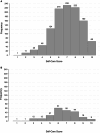Association Between Caregiver Strain and Self-Care Among Caregivers With Hypertension: Findings From the REGARDS Study
- PMID: 39082397
- PMCID: PMC11964032
- DOI: 10.1161/JAHA.123.033477
Association Between Caregiver Strain and Self-Care Among Caregivers With Hypertension: Findings From the REGARDS Study
Abstract
Background: Self-care for adults with hypertension includes adherence to lifestyle behaviors and medication. For unpaid caregivers with hypertension, the burden of family caregiving may adversely impact self-care. We examined the association between caregiver strain and hypertension self-care among caregivers with hypertension.
Methods and results: We included participants of the REGARDS (Reasons for Geographic and Racial Differences in Stroke) study who identified as caregivers and had hypertension. Caregiver strain, assessed by self-report, was categorized as "none/some" or "high." Hypertension self-care was assessed individually across 5 domains (Dietary Approaches to Stop Hypertension [DASH] diet, physical activity, alcohol use, cigarette smoking, and medication adherence) and a composite self-care score summing performance across them. The association between caregiver strain and hypertension self-care was examined with multivariable linear regression. Among the 2128 caregivers with hypertension, 18.1% reported high caregiver strain. Caregivers with high strain versus those with none/some were less adherent to the DASH diet (50.8% versus 38.9%, P<0.002), physically inactive (44.4% versus 36.2%, P<0.009), current smokers (19.7% versus 13.9%, P<0.004), and had lower overall self-care scores (6.6 [SD 1.7] versus 7.0 [SD 1.7], P<0.001). In an age-adjusted model, high caregiver strain was associated with worse hypertension self-care (β=-0.37 [95% CI, -0.61 to -0.13]); this remained significant but was reduced in magnitude after adjustment for sociodemographics (β=-0.35 [-0.59 to -0.11]), comorbidities (β=-0.34 [-0.57 to -0.10]), caregiving intensity (β=-0.34 [-0.59 to 0.10]), and psychological factors (β=-0.26 [-0.51 to 0.00]).
Conclusions: High caregiver strain was associated with worse hypertension self-care overall and across individual domains. Increased awareness of caregiver strain and its potential impact on hypertension self-care is warranted.
Keywords: caregivers; cohort study; hypertension; self‐care.
Figures


References
-
- Weber‐Raley L. AARP and National Alliance for Caregiving. Caregiving in the United States 2020. Washington, DC: AARP. May 2020. 10.26419/ppi.00103.001. - DOI
-
- Weber‐Raley L, Smith E; Caregiving in the U.S . National Alliance for Caregiving and the AARP Public Policy Institute. 2015. https://www.caregiving.org/wp‐content/uploads/2020/05/2015_Caregivingint....
Publication types
MeSH terms
Substances
LinkOut - more resources
Full Text Sources
Medical

